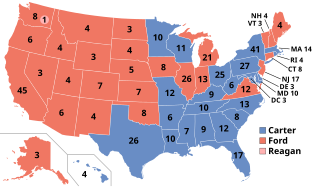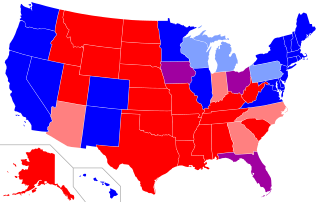Related Research Articles

The 2000 United States presidential election was the 54th quadrennial presidential election, held on Tuesday, November 7, 2000. The Republican nominee, Governor George W. Bush of Texas, the eldest son of George H. W. Bush, narrowly defeated incumbent Democratic Vice President Al Gore. It was the fourth of five U.S. presidential elections, and the first since 1888, in which the winning candidate lost the popular vote, and is considered one of the closest U.S. presidential elections, with long-standing controversy about the result. Gore conceded the election on December 13.

The 1996 United States presidential election was the 53rd quadrennial presidential election, held on Tuesday, November 5, 1996. Incumbent Democratic President Bill Clinton defeated former Senate Majority Leader Bob Dole, the Republican nominee, and Ross Perot, the Reform Party nominee and 1992 independent presidential candidate.

The 1992 United States presidential election was the 52nd quadrennial presidential election, held on Tuesday, November 3, 1992. Democratic Governor Bill Clinton of Arkansas defeated incumbent Republican President George H. W. Bush and independent businessman Ross Perot of Texas. The election marked the end of a period of Republican dominance in American presidential politics that began in 1968, and also marked the end of 12 years of Republican rule of the White House, as well as the end of the Greatest Generation's 32-year American rule and the beginning of the baby boomers' 28-year dominance until 2020. It was the last time the incumbent president failed to win a second term until Donald Trump in 2020, as well as the first election since 1932 in which an elected incumbent Republican president was defeated.

The 1976 United States presidential election was the 48th quadrennial presidential election, held on Tuesday, November 2, 1976. The Democratic nominee, former Georgia governor Jimmy Carter, narrowly defeated incumbent Republican President Gerald Ford. This was the first presidential election since 1932 in which the incumbent was defeated, as well as the only Democratic victory of the six presidential elections between 1968 and 1988.
2024 (MMXXIV) is the current year, and is a leap year starting on Monday of the Gregorian calendar, the 2024th year of the Common Era (CE) and Anno Domini (AD) designations, the 24th year of the 3rd millennium and the 21st century, and the 5th year of the 2020s decade.

In the United States, the Electoral College is the group of presidential electors that is formed every four years during the presidential election for the sole purpose of voting for the president and vice president. The process is described in Article II of the U.S. Constitution. The number of electoral votes a state has equals its number of Senators (2) plus its number of Representatives in the House of Representatives, the latter being dependent on the Census's reported population. Each state appoints electors using legal procedures determined by its legislature, equal in number to its congressional delegation totaling 535 electors in the 50 states. The Twenty-third Amendment from 1961 granted the federal District of Columbia three electors, bringing the total number of electors to 538. Federal office holders, including senators and representatives, cannot be electors. Of the current 538 electors, a simple majority of 270 or more electoral votes is required to elect the president and vice president. If no candidate achieves a majority there, a contingent election is held by the House of Representatives to elect the president and by the Senate to elect the vice president.

The Indian National Congress (INC), colloquially the Congress Party or simply the Congress, is a political party in India with deep roots in most regions of India. Founded on 28 December 1885, it was the first modern nationalist movement to emerge in the British Empire in Asia and Africa. From the late 19th century, and especially after 1920, under the leadership of Mahatma Gandhi, the Congress became the principal leader of the Indian independence movement. The Congress led India to independence from the United Kingdom, and significantly influenced other anti-colonial nationalist movements in the British Empire.
The incumbent is the current holder of an office or position. In an election, the incumbent is the person holding or acting in the position that is up for election, regardless of whether they are seeking re-election.

The 2008 United States presidential election was the 56th quadrennial presidential election, held on Tuesday, November 4, 2008. The Democratic ticket of Barack Obama, the junior senator from Illinois, and Joe Biden, the senior senator from Delaware, defeated the Republican ticket of John McCain, the senior senator from Arizona, and Sarah Palin, the governor of Alaska. Obama became the first African American to be elected to the presidency, as well as being only the third sitting United States senator elected president, joining Warren G. Harding and John F. Kennedy. Meanwhile, this was only the second successful all-senator ticket since the 1960 election and is the only election where both major party nominees were sitting senators. This was the first election since 1952 in which neither the incumbent president nor vice president was on the ballot, as well as the first election since 1928 in which neither ran for the nomination.

Starting with the 2000 United States presidential election, the terms "red state" and "blue state" have referred to US states whose voters vote predominantly for one party—the Republican Party in red states and the Democratic Party in blue states—in presidential and other statewide elections. By contrast, states where the vote fluctuates between the Democratic and Republican candidates are known as "swing states" or "purple states". Examining patterns within states reveals that the reversal of the two parties' geographic bases has happened at the state level, but it is more complicated locally, with urban-rural divides associated with many of the largest changes.

The 2004 United States presidential election was the 55th quadrennial presidential election, held on Tuesday, November 2, 2004. The Republican ticket of incumbent President George W. Bush and his running mate incumbent Vice President Dick Cheney was re-elected to a second term. They narrowly defeated the Democratic ticket of John Kerry, a senator from Massachusetts and his running mate John Edwards, a senator from North Carolina.
An independent, non-partisan politician or non-affiliated politician is a politician not affiliated with any political party or bureaucratic association. There are numerous reasons why someone may stand for office as an independent.

The 2012 United States presidential election was the 57th quadrennial presidential election, held on Tuesday, November 6, 2012. Incumbent Democratic President Barack Obama and his running mate, incumbent Vice President Joe Biden, were elected to a second term. They defeated the Republican ticket of former Governor of Massachusetts Mitt Romney and U.S. Representative Paul Ryan of Wisconsin.

The 2016 United States presidential election was the 58th quadrennial presidential election, held on Tuesday, November 8, 2016. The Republican ticket, businessman Donald Trump and Indiana governor Mike Pence, defeated the Democratic ticket of former secretary of state and First Lady of the United States Hillary Clinton and the junior senator from Virginia, Tim Kaine, in what was considered one of the biggest political upsets in American history. It was the fifth and most recent presidential election in which the winning candidate lost the popular vote. It was also the sixth and most recent presidential election in U.S. history in which both major party candidates were registered in the same home state; the others have been in 1860, 1904, 1920, 1940, and 1944.

The election of the president and the vice president of the United States is an indirect election in which citizens of the United States who are registered to vote in one of the fifty U.S. states or in Washington, D.C., cast ballots not directly for those offices, but instead for members of the Electoral College. These electors then cast direct votes, known as electoral votes, for president, and for vice president. The candidate who receives an absolute majority of electoral votes is then elected to that office. If no candidate receives an absolute majority of the votes for president, the House of Representatives elects the president; likewise if no one receives an absolute majority of the votes for vice president, then the Senate elects the vice president.

The 2020 United States presidential election was the 59th quadrennial presidential election, held on Tuesday, November 3, 2020. The Democratic ticket of former vice president Joe Biden and the junior U.S. senator from California Kamala Harris defeated the incumbent Republican president, Donald Trump, and vice president, Mike Pence. The election took place against the backdrop of the global COVID-19 pandemic and related recession. The election saw the highest voter turnout by percentage since 1900, with each of the two main tickets receiving more than 74 million votes, surpassing Barack Obama's record of 69.5 million votes from 2008. Biden received more than 81 million votes, the most votes ever cast for a candidate in a U.S. presidential election.

The 2024 United States elections are scheduled to be held on Tuesday, November 5, 2024. During this presidential election year, the president and vice president will be elected. In addition, all 435 seats in the United States House of Representatives and 34 of the 100 seats in the United States Senate will be contested to determine the membership of the 119th United States Congress. Thirteen state and territorial governorships and numerous other state and local elections will also be contested.

The 2024 United States Senate elections are scheduled to be held on November 5, 2024, as part of the 2024 United States elections. Thirty-three of the 100 seats in the U.S. Senate will be contested in regular elections. Senators are divided into three classes whose six-year terms are staggered so that a different class is elected every two years. Class 1 senators will face election in 2024.

The 2024 United States presidential election will be the 60th quadrennial presidential election, set to be held on Tuesday, November 5, 2024. Voters in each state and the District of Columbia will choose electors to the Electoral College, who will then elect a president and vice president for a term of four years.

The 2024 United States House of Representatives elections will be held on November 5, 2024, as part of the 2024 United States elections, to elect representatives from all 435 congressional districts across each of the 50 U.S. states, as well as 6 non-voting delegates from the District of Columbia and the inhabited U.S. territories to the United States House of Representatives. Special elections have also been held on various dates in 2024. Numerous other federal, state, and local elections, including the U.S. presidential election and elections to the Senate, will also be held on this date. The winners of this election will serve in the 119th United States Congress, with seats apportioned among the states based on the 2020 United States census.
References
- ↑ "By-Elections 1951-1954". Psephos. Archived from the original on 16 March 2011.